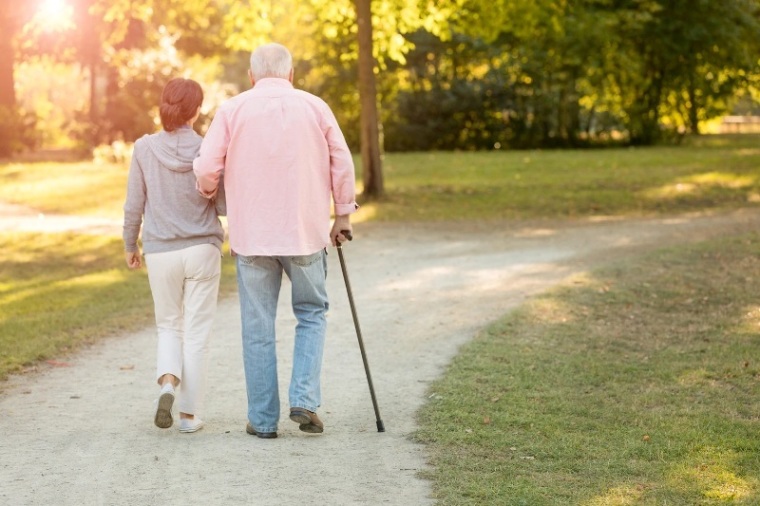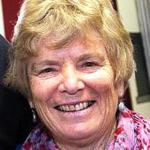
Most of the time we live as if we won’t die – or if that prospect is only a vague future possibility. Death comes more into focus when someone close to us only has a short time to live. In order to ‘walk’ with that person, we have to come to terms with death; with what it means for that person soon to die, and what it means for us.
Walking with a dying person is a privilege – and a responsibility. We have to be very careful how we do that. We must not project our own feelings and thoughts about death on to them. That may cause huge problems. When eager Christians encourage a dying person with Bible verses about healing because they can’t accept he/she is dying, then they may be denying them a special time of preparation. (In one case, a friend with cancer was so preoccupied with his healing that he never prepared for death or prepared his loved ones. His unbelieving wife and vulnerable grandsons were left to pick up the pieces. They found the God he’d believed in didn’t answer prayer after all.)
Preparing for the inevitable
Even worse has been the situation where someone’s untimely death has been denied. One loving mother vehemently declared her belief that her dead daughter would be raised, based on a promise given to her by a friend. She forewent funeral arrangements, leaving vulnerable people in limbo. They didn’t know whether to grieve, or wait in expectation that the earnest prayers for resurrection would be answered. Eventually the girl’s mother had to accept that her daughter was gone, and plan the funeral. She had missed out on so much important spiritual preparation that could have been hers, and on the right kind of support from others.
That’s not walking with the dying – or with the grieving.
Understanding what the dying person knows
When my 96 year old mother developed an infection which took her life after only eight days, I knew what she wanted. I knew what death meant for her. There were no whispered conversations around her hospital bed; as family came and went, we openly talked about her forthcoming funeral, and a number of practical matters that would need to be dealt with. All through her life, she was part of such conversations, and if she was able to hear us, she would be glad to know we were preparing.
My mother had been mentally competent up to the point where she slipped into a coma. She also knew that she was going. “I’m on the way out,” she had declared when still capable of speech. She had a Christian faith of sorts, commenting that, as it said in the Bible, “in my Father’s house are many rooms and I go to prepare a place for you,” she thought there would be space enough for her. Besides, she wanted to meet her birth mother – she’d been adopted at 11 months – and see her grandson who had died at the age of 20, as well as my father, with whom she’d enjoyed 60 years of marriage. There was no doubt in her mind as to where she was going, and she’d planned her funeral accordingly.
To walk with her through those eight hospital days was a special time, helped as it was by superb nursing care and support for us as a family. That journey was a privilege.
Walking the hard journeys
It’s not always like that of course. Some people live with agonising memories of the last days or weeks of a loved one’s life. Or they live with the diminution of the person – as in dementia (the body is left but the mind has gone); or a tragic disease such as Motor Neurone Disease, where there’s been an active mind in a body that’s progressively shut down.
Sometimes the journey is a very short one; and there’s little time to adjust to the fact that death is on the horizon. My father had been unwell for over five years, after he suffered a cardiac arrest when he was 75. We always knew life was somewhat tenuous for him, but it was less than 48 hours after he was moved into a hospice when he died.
His soul had been seared by his front-line experience in Italy during World War 2, and it was comforting to me to know that he was finally released into the healing he needed.
When a death is untimely
My nephew died prematurely at the age of 20 in North America. The ultimate mystery of why such a tragedy had happened (he’d been pulled out of a pool at a resort but hadn’t regained consciousness) was something that those of us who did believe could only leave in God’s hands.
It was only his parents who were at his bedside when the machine keeping his body alive was turned off. How they were provided for when they travelled for the first time out of NZ to go to his bedside, and be with him in his final unconscious days, is a wonderful story of God’s grace.
How we approach sudden untimely deaths depends so much on how we already see life and death. Similarly, how we walk with someone else when it’s clear the end is coming depends so much on our own understanding of what death is, and what the next life is all about.
Facing up to life – and to death
What we bring to such situations has already been forged through our own experience of God, and of life and death. For those who subscribe to the notion that we are only material beings, and that death is the end of who we are – and that’s it – then it is natural their perspective will be very different.
A believer though can know the ‘peace that passes all understanding’, even in the face of death, because, as the Psalmist says, “All our times are in His hands.” If we have such a perspective, then we are much better equipped to walk with a dying person.

Liz Hay rejoices in living in a beautiful part of God’s creation in a high country mountain basin; and she also rejoices in hearing stories of God at work in people’s lives. One of her favourite activities is reading fascinating biographies that illustrate the wonderful ways God works uniquely with each person.